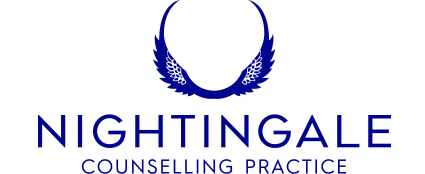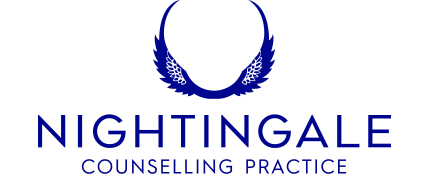Cognitive Behavioural Therapy (CBT), is a talking therapy that focuses on how your negative thought patterns and catastrophic thinking, affect the way you feel. The way you view a situation is key to how you feel about it. If your negative interpretation of situations goes unchallenged, then these patterns can become part of a continuous cycle. Understanding your thoughts, how they affect your behaviours, feelings, and emotions will also help you to understand why you feel the way you do.
When you first make contact our Senior Counselling Consultant will assess your personal issues and challenges and decide the best way forward for you. She will refer you to either one of our CBT therapists or may decide that working with our psychologists will be more productive for you.
Testimonial

Nightingale Counselling was recommended to me through another professional contact. I found that the counselling sessions with Nightingale were open, honest, and allowed me the time and space to discuss sensitive, and at times, painful issues in a safe and non-judgemental environment. I was led through a structured approach to gain a deeper understanding of the emotions I was experiencing and offered very practical solutions to work through these issues. The approach was always backed up with both practical experience and current research. I also really appreciate and benefit from the professional approach taken which is regularly updated by the current academic conclusions and research. I find taking time out to talk through normal life challenges ensures that I keep issues in perspective and don’t lose my sense of humour. I really value the support nightingale offers.
CBT client

Cognitive Behavioural Therapy will:
- Examine individual patterns of thoughts, emotions, and actions
- Help clients make sense of overwhelming problems by breaking them down into smaller parts
- Examine ways to change unhelpful thoughts and behaviours
- Explore strategies to deal with problems
- Provide ‘homework’, in which clients can practice strategies in their everyday life
- Aim to achieve explicitly agreed therapeutic goals within a time-limited framework
- Equip clients with life-long skills that they can continue to practice and develop even after the sessions have finished, making it less likely that their symptoms or problems will return
You must learn to master a new way to think before you can master a new way to be.
Nightingale Counselling CBT therapists, working with the above conditions, will be qualified to Diploma level in Cognitive Behavioural Psychotherapy (CBT). We use CBT therapy in conjunction will other models of counselling to effect change. The approach we use ensures we are able to help clients to break patterns from the past, alleviate the symptoms which are causing them to feel anxious or low, and ensure they develop the tools to enable them to stay on track. As part of this process we will give you ‘homework’ and also offer directed reading.
CBT therapists tend to work mainly with the milder end of the spectrum, on the above challenges. In most cases, CBT therapy will be sufficient to effect change. However, if the therapy is not helping you, we will consider referring you to one of our psychologists. Psychologists work with the more complex end of mental health so therefore have more specialisms to effect change.
Cognitive Behavioural Therapy (CBT), is a talking therapy that focuses on how your negative thought patterns and catastrophic thinking, affect the way you feel. The way you view a situation is key to how you feel about it. If your negative interpretation of situations goes unchallenged, then these patterns can become part of a continuous cycle. Understanding your thoughts, how they affect your behaviours, feelings, and emotions will also help you to understand why you feel the way you do.
When you first make contact our Senior Counselling Consultant will assess your personal issues and challenges and decide the best way forward for you. She will refer you to either one of our CBT therapists or may decide that working with our psychologists will be more productive for you.
Testimonial

Nightingale Counselling was recommended to me through another professional contact. I found that the counselling sessions with Nightingale were open, honest, and allowed me the time and space to discuss sensitive, and at times, painful issues in a safe and non-judgemental environment. I was led through a structured approach to gain a deeper understanding of the emotions I was experiencing and offered very practical solutions to work through these issues. The approach was always backed up with both practical experience and current research. I also really appreciate and benefit from the professional approach taken which is regularly updated by the current academic conclusions and research. I find taking time out to talk through normal life challenges ensures that I keep issues in perspective and don’t lose my sense of humour. I really value the support nightingale offers.
CBT client

Cognitive Behavioural Therapy will:
- Examine individual patterns of thoughts, emotions, and actions
- Help clients make sense of overwhelming problems by breaking them down into smaller parts
- Examine ways to change unhelpful thoughts and behaviours
- Explore strategies to deal with problems
- Provide ‘homework’, in which clients can practice strategies in their everyday life
- Aim to achieve explicitly agreed therapeutic goals within a time-limited framework
- Equip clients with life-long skills that they can continue to practice and develop even after the sessions have finished, making it less likely that their symptoms or problems will return
You must learn to master a new way to think before you can master a new way to be.
Nightingale Counselling CBT therapists, working with the above conditions, will be qualified to Diploma level in Cognitive Behavioural Psychotherapy (CBT). We use CBT therapy in conjunction will other models of counselling to effect change. The approach we use ensures we are able to help clients to break patterns from the past, alleviate the symptoms which are causing them to feel anxious or low, and ensure they develop the tools to enable them to stay on track. As part of this process we will give you ‘homework’ and also offer directed reading.
CBT therapists tend to work mainly with the milder end of the spectrum, on the above challenges. In most cases, CBT therapy will be sufficient to effect change. However, if the therapy is not helping you, we will consider referring you to one of our psychologists. Psychologists work with the more complex end of mental health so therefore have more specialisms to effect change.
“Our thoughts, our feelings, and our behaviours are all interconnected.”
Focus on your ‘Circle of Influence’
Stress… even the word can remind me of the times that I have suffered badly from it. It is like a misbehaving TV set that turns down the volume to my reasonable voice. It also [...]




